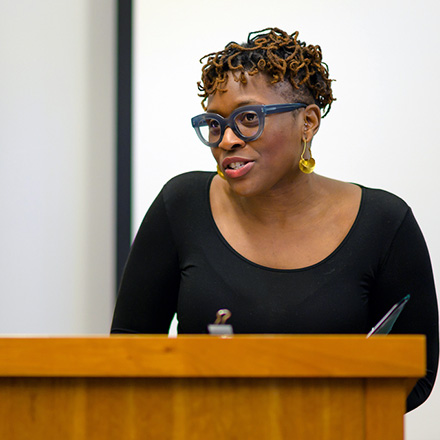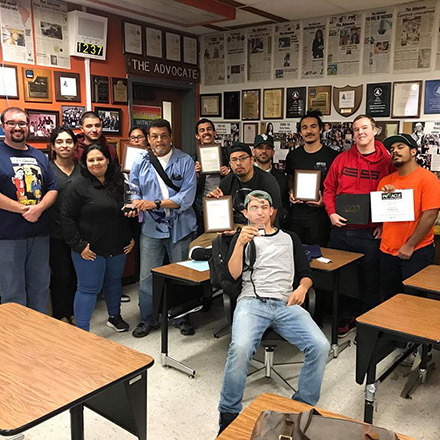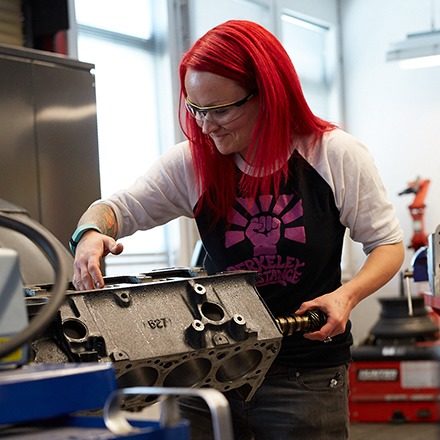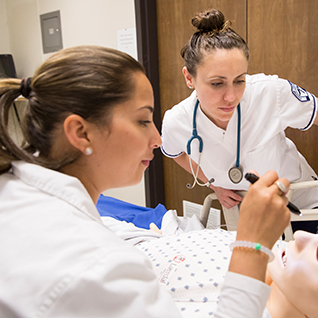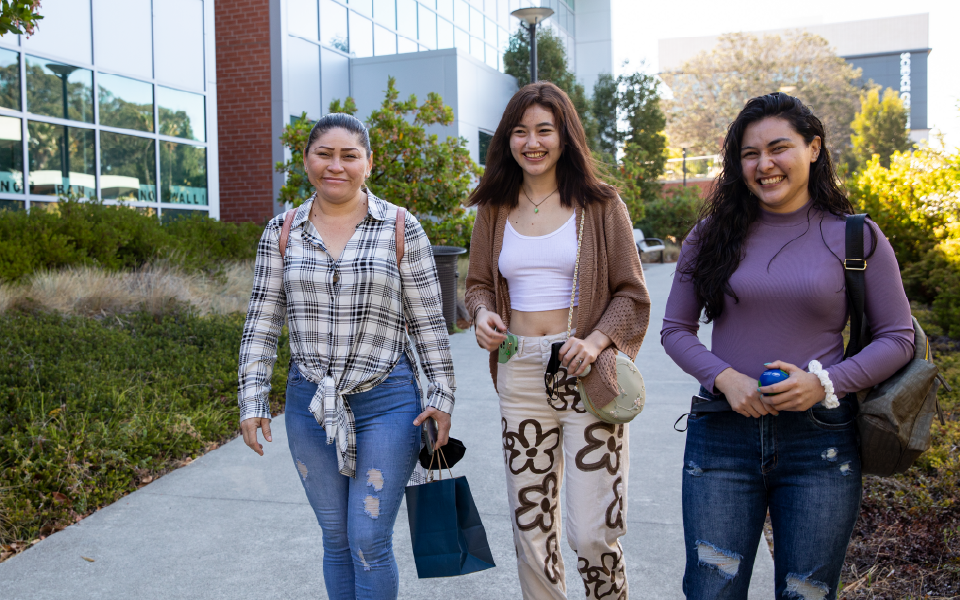At CCC, we’ve got your back.
We’ve Also Got…
Award-Winning Programs
Contra Costa College has earned accolades for many of its academic and support programs at local, state, and national levels. We believe that, through the power of education, students will enjoy a better quality of life, communities will thrive economically and socially, and families and neighborhoods will be made stronger.
Who We Are
Contra Costa College (CCC) has served the dynamic and diverse communities of West Contra Costa County since 1949. A proud Hispanic-Serving Institution with a commitment to equity, student success, and community empowerment, CCC offers strong academic support, small class sizes, and career-connected programs. The college is also home to nationally recognized programs, including its Middle College High School partnership, award-winning student newspaper, and NASA-affiliated STEM initiatives.
The college is located on 83 acres of a beautiful, naturally landscaped site accentuated by Wildcat Creek running through the rolling hills of San Pablo and Richmond.
CCC affirms that all individuals have inherent worth and dignity and are entitled to develop their full potential. The college is an integral part of the greater community and serves as a model of excellence providing education to help its students fulfill their dreams. The college maintains that its students will enjoy an improved quality of life, that communities will prosper economically and socially, and that families and neighborhoods will be strengthened when residents share a commitment to lifelong learning.
Mission
Contra Costa College is a public community college serving the diverse communities of West Contra Costa County and all others seeking a quality education. The College fosters transformational educational experiences and responsive services that ensure effective student learning and institutional effectiveness by committing its resources using equitable, inclusive and integrated decision-making processes. Contra Costa College offers associate degrees, certificates, transfer preparation, lifelong learning, and career educational opportunities aimed at helping students achieve their economic and educational goals, as well as courses designed to support lifelong learning.
Vision
Contra Costa College strives to provide a high-quality education that transforms student lives in an atmosphere that celebrates academic achievement, diversity, community, and innovation.
Values
Contra Costa College’s commitment to its mission derives strength and guidance from institutional values. As a community of educators, the college values:
- GROWTH to help students learn and to improve the economic and social vitality of communities through education;
- INCLUSION of diverse opinions, ideas, peoples, and traditions;
- FREEDOM to pursue and fulfill educational goals in an environment that is safe and respectful for all students, all faculty, all classified professionals, and all managers alike; and
- INTEGRITY in all facets of our college interactions and operations.
Institutional Student Learning Outcomes – Support an environment that encourages and enables the members of our community to gain:
- Critical thinking skills and abilities, including evaluating, analyzing, and applying information.
- Communication skills using verbal, auditory, written, numerical, and visual forms.
- Awareness of themselves, their community, and the world around them, leading to personal responsibility, ethics, and civic engagement.
Institutional Goals
Topic Area 1. Institutional Capacity and College Community Cohesion
Goal 1.1. Strengthen connection and representation of the college community in decision- making process and participatory governance.
Action Area 1.1.1. Update decision-making process and participatory governance structure
Action Area 1.1.2. Develop a centralized, easily accessible location illustrating the decision-making process and participatory governance structure
Action Area 1.1.3. Ensure that participatory governance records are easy to access and reference
Action Area 1.1.4. Ensure regular training for all employees on decision-making and participatory governance processes
Action Area 1.1.5. Foster a culture in which participatory governance involvement is encouraged and admired
Goal 1.2. Steward College Resources in alignment with the Strategic Plan utilizing a clear, transparent, data-based decision-making processes for the College Budget.
Action Area 1.2.1. Develop and implement a comprehensive process to holistically evaluate the program review process
Action Area 1.2.2. Conduct a comprehensive review of programs and services, resulting in a prioritization that is widely communicated
Action Area 1.2.3. Develop a comprehensive and transparent budget setting and projecting process aligned with the Strategic Plan
Action Area 1.2.4. Develop strategies to increase external funding sources
Action Area 1.2.5. Understand the impacts of the Student-Centered Funding Formula at CCC, and respond accordingly
Goal 1.3. Develop a Strategic Enrollment Management (SEM) Strategy.
Action Area 1.3.1. Actively manage and track enrollment
Action Area 1.3.2. Institute a SEM committee within the participatory governance structure
Action Area 1.3.3. Develop trainings to assure shared understanding of the comprehensive definition of SEM, which includes efforts to identify, recruit, enroll, retain, and graduate students in alignment with our mission and strategic goals while maintaining fiscal sustainability
Action Area 1.3.4. Develop a strong recruitment and retention program
Action Area 1.3.5. Develop a course schedule that meets our diverse student needs
Action Area 1.3.6. Strengthen the Marketing program
Action Area 1.3.7. Redevelop and strengthen the integrated support structure required to improve student retention, progress to degree, and graduation
Goal 1.4. Increase faculty, staff, and student morale, and build a strong sense of community cohesion so that the CCC community works well together
Action Area 1.4.1. Clarify expectations for each role on campus, and the connection between daily work and the mission of the college
Action Area 1.4.2. Recognize and support colleagues on campus
Action Area 1.4.3. Embrace cultural humility and equity to create safety, collaboration, and wellness spaces
Action Area 1.4.4. Ensure that students are pro-actively included in assessment and development of our campus culture so that it is student-centered
Action Area 1.4.5. Develop, implement, and assess a program of activities and events that bring college constituents together, developing and growing community within and across communities, as well as within and across administrative boundaries
Action Area 1.4.6. Identify and employ strategies towards having the demographics of the employee base mirror that of the students
Action Area 1.4.7. Work to support holistic health amongst CCC students, faculty, and staff
Goal 1.5. Provide a campus that furthers and celebrates learning and the rich culture of our community
Action Area 1.5.1. Display (or install or provide) art on campus to celebrate diversity
Action Area 1.5.2. Provide inclusive spaces for students to celebrate and be supported in their uniqueness
Action Area 1.5.3. Develop professional development opportunities that support the college in implementing culturally relevant practices across all work
Topic Area 2. Academics and Student Support
Goal 2.1. Implement Guided Pathways in order to ensure student-focused academic programs
Action Area 2.1.1. Map Pathways to Student End Goals
Action Area 2.1.2. Ensure students make informed decisions when choosing a pathway through the development of an educational plan
Action Area 2.1.3. Provide intentional and strategic student focused pathways supports that are responsive to student needs
Action Area 2.1.4. Provide comprehensive pathway data to ensure learning and student goal attainment
Action Area 2.1.5. Provide faculty and staff with training and support as the College transitions to a Guided Pathways model
Goal 2.2. Ensure that program review is strongly beneficial to each program by tying program review more explicitly to the everyday work of the college
Action Area 2.2.1. Research the best data-gathering practices for Community College Program Review and engage in program-level data-review each semester
Action Area 2.2.2. Develop a data-based program review process, with benchmarking for each program, that allows an annual high-level assessment of progress toward goals for all programs
Action Area 2.2.3. Ensure that the program review process is inclusive of adjunct faculty, support staff, etc., and ensure that results are shared widely
Action Area 2.2.4. Establish clear actions and review strategies for programs that are performing below established standards
Action Area 2.2.5. Gather quantitative and qualitative data to help us understand student needs and the elements that lead to program success
Goal 2.3. Improve the effectiveness of campus‐wide instructional and student support
Action Area 2.3.1. Tie student support programs directly to classroom programs
Action Area 2.3.2. Embed information on student support services in all student orientation activities and Canvas shells.
Action Area 2.3.3. Develop an online advisory tool to help students explore careers and understand which support programs might benefit them, as well as how to access them
Goal 2.4. Increase institutional efficiency of student support through technology, communication and professional development
Action Area 2.4.1. Ensure all programs consistently have adequate technological tools to execute efficient and effective work, and that users are trained in the use of the tools
Action Area 2.4.2. Develop a case management system to monitor individual student needs and success
Action Area 2.4.3. Develop a central database for student support programs that describes the services and how to access them to facilitate faculty connecting students with the appropriate services
Action Area 2.4.4. Collaborate with the District, sister colleges and the broader community to improve overall operations
Action Area 2.4.5. Advance programs towards success by ensuring faculty and staff receive professional development targeted to the needs of their students and subjects
Topic Area 3. Student Success
Goal 3.1. Increase the number of community members who see Contra Costa College as their top choice for higher education
Action Area 3.1.1. Develop program offerings that respond to student populations with diverse educational goals such as re-entry, early-college, non-credit, life-long learners, skills-builders, adult learners, and degree and transfer seeking students.
Action Area 3.1.2. Assure that students that apply also enroll
Action Area 3.1.3. Build strategies to support students with financial needs
Action Area 3.1.4. Build support for first-time college students and for groups that are disproportionately impacted
Action Area 3.1.5. Create a sense of belonging and pride in our cultural diversity within the community on campus
Action Area 3.1.6. Develop an equity focused outreach and marketing strategy
Goal 3.2. Increase the number of students annually who complete their educational and career goals in a timely way
Action Area 3.2.1. Assure that student services, instructional support and curriculum respond to the changing needs of students with diverse educational goals such as re-entry, early-college, non-credit, life-long learners, skills-builders, adult learners, and degree and transfer seeking students
Action Area 3.2.2. Develop strategies to increase the number of students annually who achieve living wage jobs or advance in their careers
Action Area 3.2.3. Build a culture of collaboration and integration between Student Services and Instruction to increase impact
Action Area 3.2.4. Utilize GPs and SEM Strategies to support student goals
Goal 3.3. Improve the educational experience for students with particular emphasis on activities proven to support completion goals
Action Area 3.3.1. Support and celebrate the continuous improvement of equity minded teaching practices
Action Area 3.3.2. Support and celebrate the continuous improvement of multicultural and equity-minded pedagogy
Action Area 3.3.3. Encourage and expand mentoring and career development practices
Action Area 3.3.4. Encourage students to meet with counseling faculty to develop and follow a comprehensive Educational Plan
Action Area 3.3.5. Encourage students to take the appropriate unit load for their life circumstances, and provide direct student support to enable them to participate more fully in their education, reduce their time to completion and achieve success
Action Area 3.3.6. Support strategies for students to complete math and English their first year
Action Area 3.3.7. Utilize milestone data to analyze effectiveness of our strategies including Unit Load, Units Toward Degree, Course Success, Retention, and Persistence
Goal 3.4. Respond equitably to the unique needs of our diverse students in order to provide the support they need to achieve their full academic and career potential
Action Area 3.4.1. Embed wrap-around supports in Learning Communities
Action Area 3.4.2. Engage in proactive, inclusive and culturally-relevant student support and case management
Action Area 3.4.3. Promote direct student support for students’ basic needs
Action Area 3.4.4. Promote instructional support
Action Area 3.4.5. Promote career readiness experiences
Action Area 3.4.6. Promote Safe Zone, Dreamers Alliance, and other special population support programs
Jeanelle Hope is a First-Generation Scholar
Jeanelle says her mentors at CCC were invaluable. “Just learning how to navigate, how to get through some of these hoops and hurdles as a first-generation college student was important,” she remembers. “And, I’ll also say that I had a lot of support from the folks in student life, who helped me develop my scholarship applications, who helped me identify and find funding.” In the end, she was awarded the Kennedy-King scholarship…only be the beginning of her academic honors and accomplishments.
